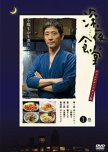
A story of eight different couples with fleeting, delicate relationships and their “simple breakfast” as if to make up for what is lacking in body and soul after spending a night together, including a man who is reunited with a former high school classmate whom he continues to have feelings for; a university student’s first date with a girl whom he met through a matchmaking app; sex friends, who have been carrying on with their rather businesslike relationship.
~~ Adapted from the manga series "One Night - Morning" by Okuyama Kenichi.
~~ Adapted from the manga series "One Night - Morning" by Okuyama Kenichi.

Both of these episodic anthology stories center around a one-night interaction and food symbolism to convey life lessons. While very different in composition, the visuals of both dramas greatly contribute to the vibe and tone of the story.

Amamiya, Nakauchi, and Kobayashi were once high school classmates. The former was class president and an honors student, Nakauchi was quiet and reserved with a penchant for cooking, and Kobayashi was a womanizing charmer. Ten years after their graduation, fate reunites them. Nakauchi has gone on to become a budding chef, but he had to quit his job after losing his sense of taste. He runs into Amamiya, works as a bartender in a quiet establishment called the Three Star Bar in Tokyo’s Nishi Ogikubo District.
Kobayashi who became an overnight sensation as a writer with his debut novel, but has been in a slump ever since, was bequeathed the bar from his grandfather, the previous owner, with the agreement that he would keep the place running until he and Amamiya finished all of the canned food that was left stocked in the pantry. Kobayashi and Amamiya convince Nakauchi to join them as their canned food “chef.”
The trio is a great success: Amamiya is always ready to lift the mood with a cocktail, the barfly-like Kobayashi is always on hand with sage words of advice, and Nakauchi cooks up a storm in the kitchen. The place becomes a hit with appreciative customers who come with problems, but usually leave with them solved, thanks to these remarkable men. But what will happen when the canned food begins to run out?
Kobayashi who became an overnight sensation as a writer with his debut novel, but has been in a slump ever since, was bequeathed the bar from his grandfather, the previous owner, with the agreement that he would keep the place running until he and Amamiya finished all of the canned food that was left stocked in the pantry. Kobayashi and Amamiya convince Nakauchi to join them as their canned food “chef.”
The trio is a great success: Amamiya is always ready to lift the mood with a cocktail, the barfly-like Kobayashi is always on hand with sage words of advice, and Nakauchi cooks up a storm in the kitchen. The place becomes a hit with appreciative customers who come with problems, but usually leave with them solved, thanks to these remarkable men. But what will happen when the canned food begins to run out?

Both are Japanese omnibi with breathtaking cinematography and are similar in vibe - both focus on unfulfilled dreams and interpersonal relationships. Both productions have themed episodes - one food (or miscellaneous in case of ANKSUGA) item per episode

Ikeda Yoshimi, a 28-year-old editor of a literary magazine who loves otome games and loves good-looking guys, will be in charge of a gourmet magazine even though she is not good at eating with ultra-small meals. However, she notices that when she eats with good-looking men, her appetite increases, and she pursues "good-looking rice" to improve her small meals.

A story of eight different couples with fleeting, delicate relationships and their “simple breakfast” as if to make up for what is lacking in body and soul after spending a night together, including a man who is reunited with a former high school classmate whom he continues to have feelings for; a university student’s first date with a girl whom he met through a matchmaking app; sex friends, who have been carrying on with their rather businesslike relationship.
~~ Adapted from the manga series "One Night - Morning" by Okuyama Kenichi.
~~ Adapted from the manga series "One Night - Morning" by Okuyama Kenichi.

A story of eight different couples with fleeting, delicate relationships and their “simple breakfast” as if to make up for what is lacking in body and soul after spending a night together, including a man who is reunited with a former high school classmate whom he continues to have feelings for; a university student’s first date with a girl whom he met through a matchmaking app; sex friends, who have been carrying on with their rather businesslike relationship.
~~ Adapted from the manga series "One Night - Morning" by Okuyama Kenichi.
~~ Adapted from the manga series "One Night - Morning" by Okuyama Kenichi.

A story of eight different couples with fleeting, delicate relationships and their “simple breakfast” as if to make up for what is lacking in body and soul after spending a night together, including a man who is reunited with a former high school classmate whom he continues to have feelings for; a university student’s first date with a girl whom he met through a matchmaking app; sex friends, who have been carrying on with their rather businesslike relationship.
~~ Adapted from the manga series "One Night - Morning" by Okuyama Kenichi.
~~ Adapted from the manga series "One Night - Morning" by Okuyama Kenichi.

A girl returns home from Paris and opens up a small patisserie with no name in a alley. There is no menu and everyday she only makes 3 types of desserts based on her mood each day. Naturally her business is not doing so well. No one knows of her past and why she appears to be so cold towards everyone holding onto some dark secret within her. One day a bright young man coincidentally enters the shop, refusing to leave and eventually becoming a staff in the store. Through his arrival, the whole atmosphere of the store changes. Will this man be able to open up her heart and let her face her past?

A story of eight different couples with fleeting, delicate relationships and their “simple breakfast” as if to make up for what is lacking in body and soul after spending a night together, including a man who is reunited with a former high school classmate whom he continues to have feelings for; a university student’s first date with a girl whom he met through a matchmaking app; sex friends, who have been carrying on with their rather businesslike relationship.
~~ Adapted from the manga series "One Night - Morning" by Okuyama Kenichi.
~~ Adapted from the manga series "One Night - Morning" by Okuyama Kenichi.


Both of these productions feature short stories centered around a main character undergoing some sort of character crisis. While not necessarily grand in scale, these story conflicts are key to the leads' opinions of themselves and their relationships.
Both productions also feature prominent and reoccurring color symbolism and other metaphoric elements. They also both use non-literal intermissions where we see the main character in a setting effectively crying out for help.
Both productions also feature prominent and reoccurring color symbolism and other metaphoric elements. They also both use non-literal intermissions where we see the main character in a setting effectively crying out for help.

This drama is a love story between Kataoka Sakuya, a grim reaper who comes to the human world for the first time, and Mochizuki Nayuki, a woman who lost her father at a young age and has devoted her life to raising her only remaining family—her younger brother. As they meet, they gradually come to understand each other, and slowly, they begin to fall in love. However, a fate that will dramatically change their lives awaits them both…

Both of these Japanese stories feature a different story arc each episode that are briefly connected by a character in the background who comes into focus in the last episode. These stories are all short-lived one-day encounters that revolve around a different dish that contributes to the episode's message in significant ways.
Furthermore, stylistically, each episode has an intermission-style scene showing the episodes' leads in an unrealistic setting with a colorful background that stands in contrast to the narrative.
Furthermore, stylistically, each episode has an intermission-style scene showing the episodes' leads in an unrealistic setting with a colorful background that stands in contrast to the narrative.

Both of these Japanese episodic anthology dramas center around a simple dish that has significant meaning to the central character of the episode. The episodes also feature characters coming to terms with an aspect of themselves or their relationships, and how quickly that can change in your everyday life.




































